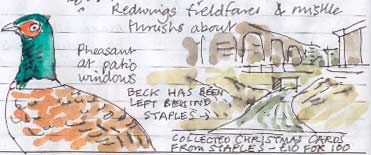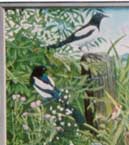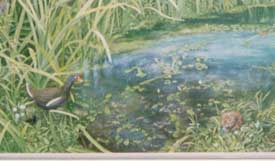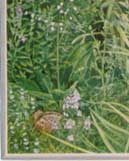|
|
 Before
I kept this online version, I got into the habit of keeping a sketchy
nature diary in an A5 page-a-day diary. Before
I kept this online version, I got into the habit of keeping a sketchy
nature diary in an A5 page-a-day diary.
The viaduct with the 'fluffy flamingo clouds'
dates from this week in 1996, from Thursday the
21st, a day when I gave a talk on Victorian naturalist and conservationist
Charles Waterton, to a full house at the RSPB members
group which was then held in the Unity Hall, Wakefield. |
What are days for?
 My
theory was that every day I saw something, so, in order to develop
my powers of observation and my understanding of the natural world, I
should make a note of whatever struck me as noteworthy each day, no matter
how trivial that might seem. What seemed important was the process of
observing and recording, even in a rudimentary fashion. My
theory was that every day I saw something, so, in order to develop
my powers of observation and my understanding of the natural world, I
should make a note of whatever struck me as noteworthy each day, no matter
how trivial that might seem. What seemed important was the process of
observing and recording, even in a rudimentary fashion.
Days were my raw material and if I didn't do anything with them, where
else were my ideas and inspiration going to come from?
On Saturday 23rd, 1996, we called at Staples in Wakefield
for our Christmas cards - a pen and ink drawing of Hartly Bank Wood, photocopied
on card. I had a computer, an Amstrad 2386, and a monochrome bubblejet
printer at the time but no scanner; those were the days when you were
limited to clip art. Uggh!
Staples must have been fairly new too, because I commented that Balne
Beck, which flows through the Cathedral Retail Park, had been left, un-culverted,
behind it.
A Dabchick in the Snow
On this day, the 24th, in 1996, I sketched a dabchick on the river and
snow settling on the riverbank. I invariably drew from memory when I wrote
up my diary in the evening. Sketchbooks were another strand of my work.
 Going
back further, to 30 years ago, on Sunday the 23rd November 1975
I was walking back from a student play at Bretton Hall college when I
met a ferret in the village. I bent down to say hello
to it and it surprised me by running up my arm and, if I remember rightly,
it nuzzled itself into my anorak before scampering off. Going
back further, to 30 years ago, on Sunday the 23rd November 1975
I was walking back from a student play at Bretton Hall college when I
met a ferret in the village. I bent down to say hello
to it and it surprised me by running up my arm and, if I remember rightly,
it nuzzled itself into my anorak before scampering off.
Pond Mural
|
Pond mural, acrylic on board, 1976
(colour a bit too chalky in the middle this print from a slide) |
 The
day after this close encounter with the ferret I was working on a large
painting of a pond - my first big commission after leaving college. According
to my diary, my flatmate Jill, a graduate in painting
from the Royal College, who had then just started teaching practice, came
in, evidently feeling out of sorts, and took me to task over my progress
on the painting. It was on an 8ft x 4ft piece of hardboard and I'd been
working on it since August. It would take another 4 or 5 months to finish. The
day after this close encounter with the ferret I was working on a large
painting of a pond - my first big commission after leaving college. According
to my diary, my flatmate Jill, a graduate in painting
from the Royal College, who had then just started teaching practice, came
in, evidently feeling out of sorts, and took me to task over my progress
on the painting. It was on an 8ft x 4ft piece of hardboard and I'd been
working on it since August. It would take another 4 or 5 months to finish.
 'It's
ridiculous spending so long on a painting,' she told me, 'you're successful
. . . from the point of view of making a living. But when are you going
to get around to what you ought to be doing?' 'It's
ridiculous spending so long on a painting,' she told me, 'you're successful
. . . from the point of view of making a living. But when are you going
to get around to what you ought to be doing?'
That point seems as pertinent now as it did in 1975. When am
I going to get around to what I ought to be doing?!
I painted all the wildlife - plants, pond life, animals, birds and butterflies
- life size. I was influenced by Millais' Ophelia
and perhaps a bit by Richard Dadd's The Fairy Feller's
Master-Stroke in my efforts to show the teeming life of the pond
and its surroundings. I'd made a number of detailed drawings down by the
pond in the summer and I'd taken colour slides.
Ripples on a Pond
 It
was commissioned by a successful designer from London who, a year or two
later, went to live in a country house near Oxford, taking the painting
with him and hanging it over the mantlepiece. It's over 25 years since
I last met him and I haven't seen the picture since. It
was commissioned by a successful designer from London who, a year or two
later, went to live in a country house near Oxford, taking the painting
with him and hanging it over the mantlepiece. It's over 25 years since
I last met him and I haven't seen the picture since.
Does my Pond Mural still exist? Could I arrange to see it again?
I feel as I imagine it would if I had a child who had gone out into the
world and I hadn't seen hide nor hair of him for years.
What has become of my painting and, thinking of Jill's question, what
has become of me? When am I going to get around to doing the
work I ought to be doing? Do any of us ever manage that?
Since I wrote that, I have made some progress in tracking down the painting.

Richard Bell, richard@willowisland.co.uk
|